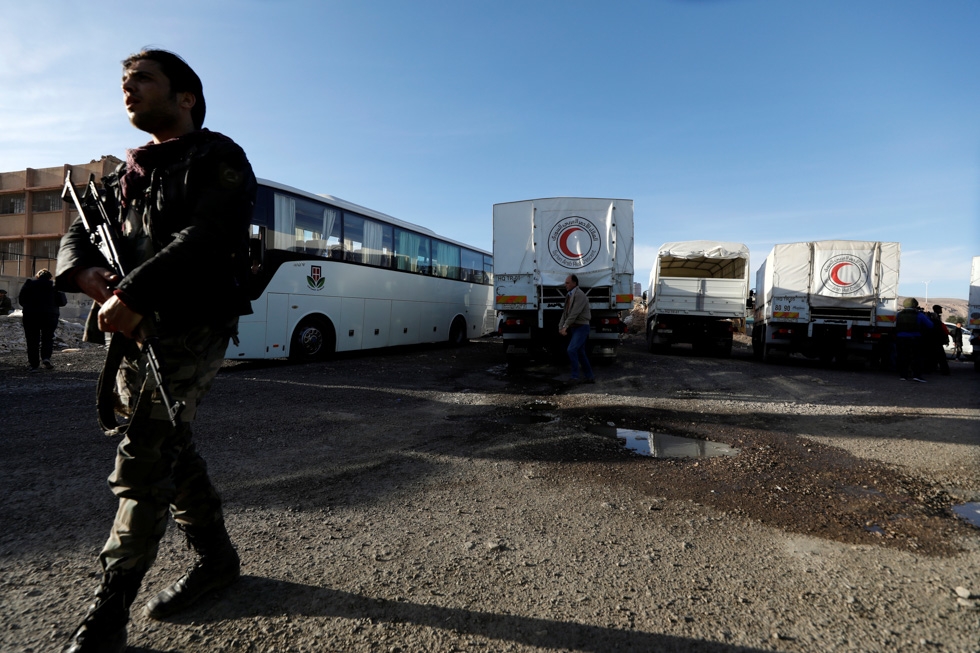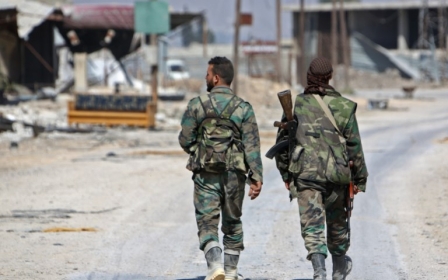Syrian army advance 'cuts rebel enclave into three'

Syrian army advances seized a key town and road in rebel-held Eastern Ghouta on Saturday, cutting off the largest town in the enclave and effectively splitting it into three, a monitor has said.
Both the Syrian Observatory for Human Rights, a Britain-based war monitor, and a military media unit run by the government's ally Hezbollah said the army had captured the town of Misraba and advanced into surrounding farms. Syrian state TV broadcast from inside the town after reporting that the army had taken it earlier on Saturday although a rebel official denied the town had fallen.
Misraba lies just south of the large towns of Douma and Harasta along the road linking them to the remaining southern area in the insurgent pocket. The roads connecting the towns to each other were all covered by army fire, the Observatory said.
Further west, the army captured a road linking the town of Douma with Harasta and in doing so, effectively split the rebel-held enclave into three isolated parts.
"Regime forces have therefore divided Eastern Ghouta into three parts - Douma and its surroundings, Harasta in the west, and the rest of the towns further south," the Observatory said.
However Hamza Birqadar, a spokesman for Jaish al-Islam, one of the two main insurgent groups in eastern Ghouta, said rebels had repelled the attack on Mesraba and neither Harasta nor Douma were cut off.
Nearly 950 civilians have been killed since Russia-backed government forces launched a blistering assault on the last opposition bastion near Damascus on 18 February.
Eastern Ghouta's 400,000 inhabitants have lived under government siege since 2013, and the enclave - more than half of which has over the past three weeks been retaken by government forces - is home to numerous armed groups.
Apart from Islamist groups such as Jaish al-Islam, militants from Hayat Tahrir al-Sham (HTS), who are mostly linked to al-Qaeda, are also deployed there.
Syrian state television aired footage of a single bus carrying 13 "fighters" and family members out of the enclave through Al-Wafideen checkpoint, without giving their affiliation.
Some appeared to be young, while others wore hoodies to cover their heads and faces.
The limited operation came as the powerful Jaish al-Islam said HTS fighters would be evacuated to the northern province of Idlib, in an arrangement struck following consultations with the United Nations and other international players.
"It has been agreed that the first group of HTS members be released from the prisons of Jaish al-Islam ... [and] moved to Idlib at their request," Jaish al-Islam said.
HTS is the main force in Idlib, in Syria's northwest and the last province outside government control.
'Enough death'
Civilians continued to bear the brunt of the violence on Friday with at least six killed in air strikes on the area of Jisreen, the Syrian Observatory for Human Rights war monitor said.
Thirteen trucks loaded with 2,400 food parcels, meanwhile, crossed into Eastern Ghouta, the International Committee of the Red Cross said, entering what UN chief Antonio Guterres has called "hell on earth".
But "shelling" near the enclave's main town of Douma threatened "to put at risk" the joint ICRC, Syrian Arab Red Crescent and United Nations convoy, said the UN humanitarian coordinator in Syria, Ali al-Zaatari.
The aid was delivered as helicopters hovered overhead and warplanes targeted areas outside Douma, according to an AFP correspondent.
The World Health Organization said it has verified 67 hits on medical facilities in Syria through January and February, nearly half of them in Eastern Ghouta.
The facilities hit included 20 hospitals, 16 health facilities, two ambulance stations and one medical supply warehouse.
Doctors and nurses in the enclave have run out of several life-saving items, according to Doctors Without Borders (MSF), which reported a "terrible medical catastrophe".
"Medical material is extremely limited, medical infrastructure has been hit and medical staff are exhausted," it said, adding that hundreds of people have been wounded and need urgent assistance.
Medical charities operating in eastern Ghouta have reported several incidents in recent weeks of what they say was chlorine gas use in government bombardments, causing choking symptoms.
On Saturday, Syria's deputy foreign minister, Faisal Mekdad, rejected those charges and accused the United States of orchestrating the accusations in order to support militant groups. "We did not deny a single request for investigation," Mekdad told a news conference.
In the face of the government's Russian-backed onslaught, Ghouta's main rebel groups had so far rejected Moscow-brokered offers to evacuate civilians or any of their own fighters.
But on 27 February they said in a letter to the United Nations they would be willing to expel militant fighters from the enclave as soon as a UN ceasefire took effect.
That offer came on the same day as a daily humanitarian "pause" called by Moscow began, a measure which fell short of a 30-day ceasefire called by the UN Security Council late last month.
Observatory head Rami Abdel Rahman said talks were underway between government representatives and local figures to organise the evacuation of civilians or fighters from parts of the enclave.
Enough destruction and death! We want to save our children and all those who have not died
- Abu Riyadh, Ghouta resident
SANA earlier said dozens of civilians were expected to leave on Friday through the Wafideen checkpoint, an agreed exit point.
An AFP correspondent at the checkpoint said green and white trucks and ambulances were parked waiting to pick up passengers.
In the town of Hammuriyeh, dozens of people took part in a protest calling for an end to the bloodshed, the Britain-based Observatory said.
"Enough destruction and death! We want to save our children and all those who have not died," said Abu Riyadh, a 47-year-old man in the town.
'Colossal human tragedy'
A negotiator from Hammuriyeh said a "civilian delegation" wanted to hold talks with the government to end the fighting in the area.
A tribal leader said more than 300 civilians from the areas of Kafr Batna, Saqba and Hammuriyeh wanted to leave.
He told journalists there had also been discussions for "500 fighters to hand over their weapons to the army".
Syria's war, which enters its eight-year next week, has killed more than 340,000 people since it erupted in 2011 with the brutal repression of anti-government protests.
UN High Commissioner for Refugees Filippo Grandi on Friday called the conflict a "colossal human tragedy".
In rebel fire on Friday, a woman and a child were killed by a mortar round that hit the Damascus suburb of Jaramana, SANA said.
On another front, Turkish President Recep Tayyip Erdogan said his forces and allied rebels could enter the northern Syrian town of Afrin "at any moment", a day after they seized another town in the area.
Turkey-led rebels have been pressing an assault on the Kurdish enclave of Afrin since January 20.
Middle East Eye propose une couverture et une analyse indépendantes et incomparables du Moyen-Orient, de l’Afrique du Nord et d’autres régions du monde. Pour en savoir plus sur la reprise de ce contenu et les frais qui s’appliquent, veuillez remplir ce formulaire [en anglais]. Pour en savoir plus sur MEE, cliquez ici [en anglais].






